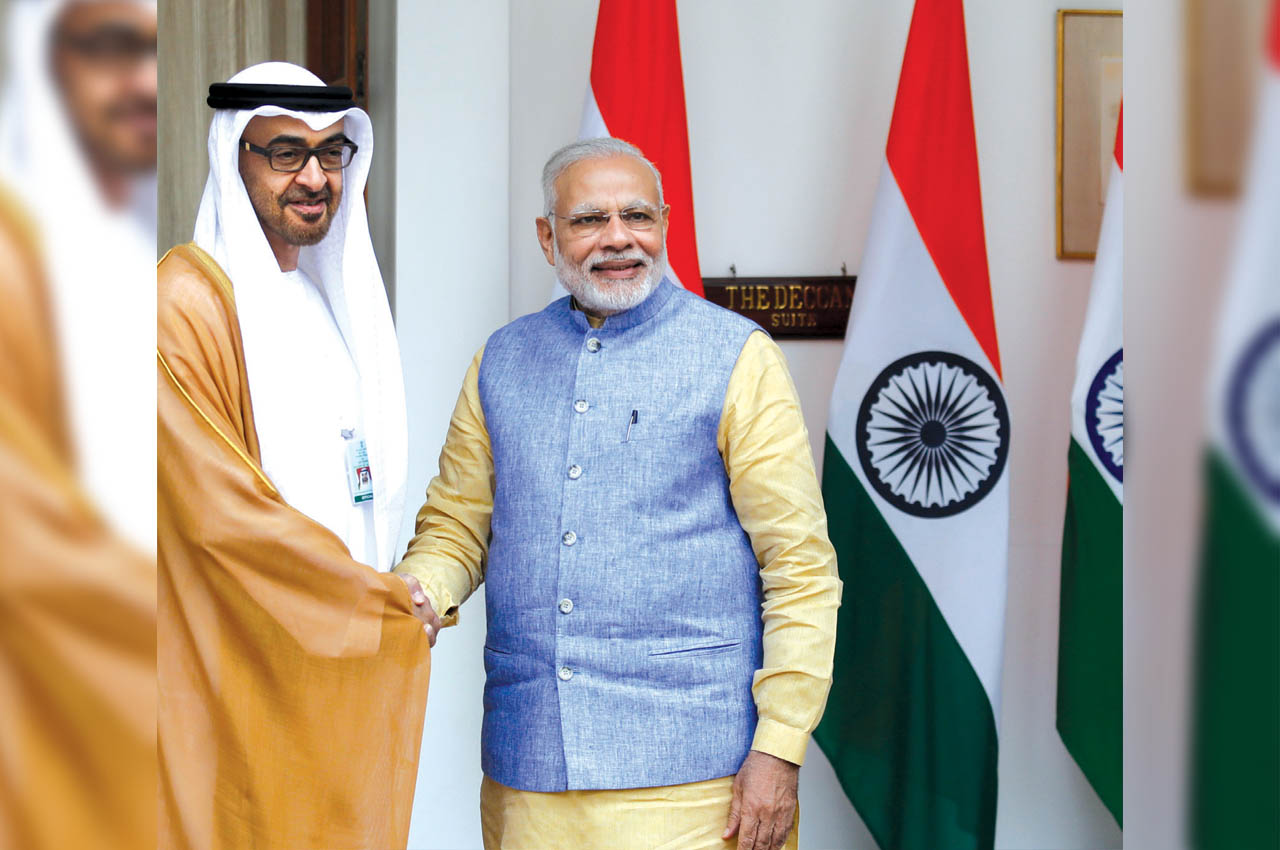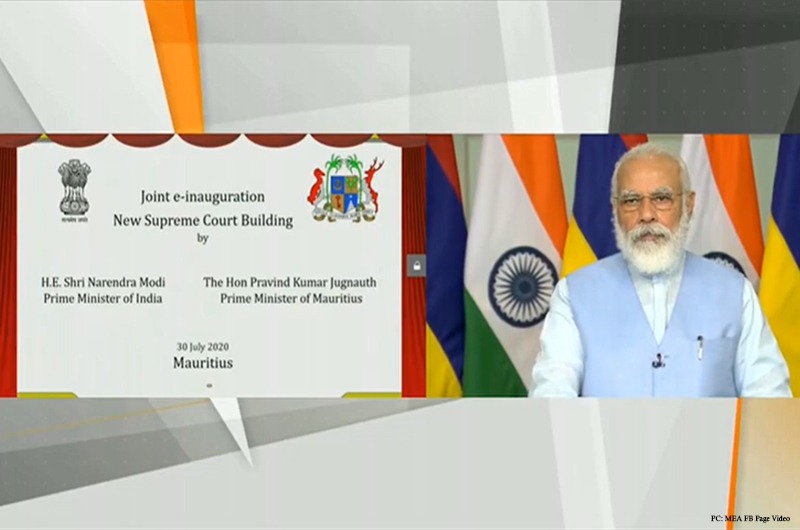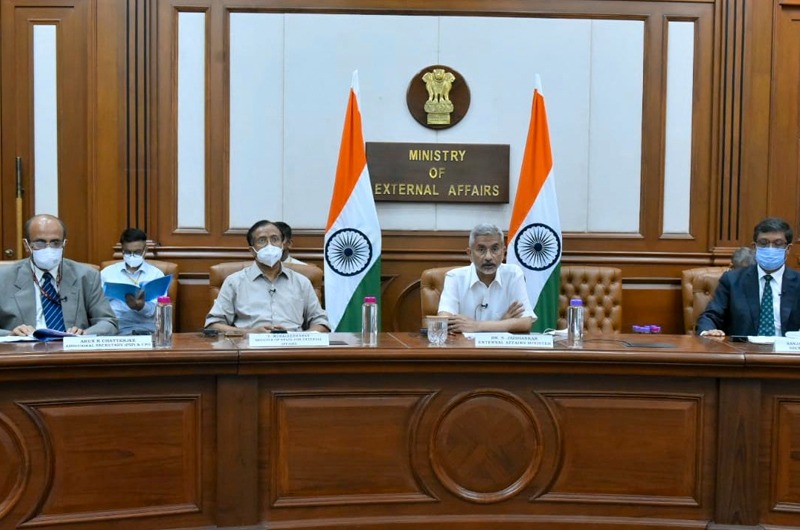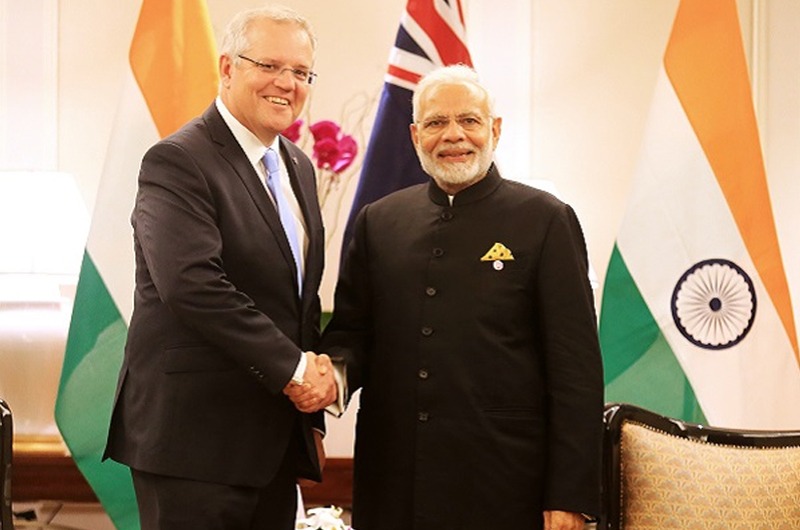The India-UAE bilateral relationship underwent an unprecedented reorientation in January 2017 when the Crown Prince of UAE, Shaikh Mohammad bin Zayed al Nahyan visited India at the invitation of India’s Prime Minister Narendra Modi to elevate the relationship between the two countries to the level of Comprehensive Strategic Partnership. Traditionally, the United Arab Emirates (UAE) has been an important trade ally and has helped India maintain its energy security while India has provided the UAE with considerable human capital and skill. The bilateral partnership announced in early 2017 outlined an evolutionary roadmap of new strategic initiatives that focus on the intersection of the economic and security interests to make the trade and human development sustainable: enhance maritime transport cooperation to secure operational integration and significant productivity gains between the two internationally dispersed economic entities; increase trade at the back of increased security of sea lanes of communication in the Western Indian Ocean; converge intel gathering mechanism for a constructive counter to terrorism and piracy in the Indian Ocean; and enhance maritime engagements to better respond to humanitarian crises for citizens of India in the UAE.
The Institutional Cooperation on Maritime Transport was one of the 14 Memorandum of Understanding (MoU)s signed by Government of the Republic of India and the Government of the UAE in January of 2017 at New Delhi. It provides a framework for enhancing bilateral maritime trade ties through facilitating maritime transport, free transfer of monies between contracting parties and reciprocal recognition of ships’ documents.
Through this major step, India hopes to generate enhanced networking, secure operational integration and significant productivity gains between the two internationally dispersed economic entities. The framework has the potential to simplify customs and other administrative formalities while making the trade more secure and sustainable. The framework also encourages the use of existing installations for waste disposal in both the countries. Stringent international and national waste disposal regulations lead to several regulatory compliance challenges for vessels and coastal establishments of both the countries. The cooperation will help the two countries find ways of meeting environmental challenges in a time-sensitive and constructive manner.
The reciprocal recognition of ship’s documents between the two nations responds to the critical need for standardizing the issuance and content of national identity documents such that the fallibility of identity systems decreases in a climate of increasing security concerns. Both the nations can benefit from securing their borders against unwanted entrants while making it easier for genuine seafarers to conduct business in a timely manner, especially for time sensitive goods like food items and other perishables.
UAE’s expertise in expansion of logistics facilities and custom services in India through investments in logistics assets can help India export food and perishables to the UAE markets at lowered logistic costs. The traditional inefficiencies in supply chain systems in India can benefit from UAE’s expertise in the development of policies, processes, warehouses and digital systems. Dubai based companies’ experiences in handling high volume cargoes using high security digital platforms has the potential to help out India’s inland trade and cold storage networks by ensuring faster and more efficient clearances. By developing this transport infrastructure at existing ports, India’s manufacturing and agriculture sectors can benefit greatly. In return, the UAE can enhance its food security; UAE is susceptible to global food price shocks due to high import dependency. Food security was highlighted as a high priority area for both the sides in the joint statement issued during the same visit of the Crown Prince of UAE “the Indian side welcomed proposal from the UAE for establishing food security parks, including through creation of high quality food processing infrastructure, integrated cold chain, value addition and preserving technology, packaging of food products and marketing”.
The announcement of the framework for free transfer of monies between contracting parties in maritime trade between India and UAE enhances ease of business with India by allowing direct remittances in shorter turnaround times to improve synergies in existing and new sectors.
During the 2015 visit of Prime Minister Modi to Dubai, the UAE government committed to investing its sovereign wealth funds in India’s infrastructure projects to an amount of $75 billion. This announcement underlined UAE’s intent to partner the future growth of India. Unless such large investment commitments—many of which could be coastal investments—are backed by a Comprehensive Strategic Partnership Agreements to secure maritime transport and shore and off shore assets from large scale terrorist operations, the two nations may not be able to optimize the benefits that accrue from the ideal geographic placement along the western rim of the Indian Ocean. Therefore, the security of port facilities in the UAE and India through partnership of Gulf navies with the Indian Navy is crucial in securing regional peace. The deep bilateral cooperation in maritime transport depicts a clear political will on both sides to keep the region stable, secure and growth focused.
For India, China’s multiplying logistical bases in Asia and Africa, China-Pakistan maritime co-operation and increased economic, military and political influence in Indian Ocean rim states and littorals is a matter of growing concern. The lack of clear strategy of the United States in the Middle East in the wake of Iraq War and Arab Spring, the rising interest of other global powers including that of Russia and the lukewarm efforts of Europe in securing the sea lanes of communication in the Indian Ocean also points to the need for India to take a lead in regional maritime transport and security and preserve its strategic stakes in the Western part of the Indian Ocean in a determinative manner. India’s ownership of the Western Indian Ocean through this bilateral comprehensive partnership agreement with the UAE is a big step towards it. The Foreign Secretary of India, S Jaishankar alluded to the momentum between the UAE and India at the Raisina Dialogue held at New Delhi, “The effort to infuse a strategic element into this organic past and influence the design of future relations under the ‘Think West’ moniker is new.”
India also has to watch the emerging nature of preferential trade agreements between the developing countries in Asia-Pacific after the United States withdrew from the Trans-Pacific Partnership (TPP) in 2017. China is being seen to benefit from this development as it can assume a larger role in setting rules for beyond-the-border issues like labor standards, environment management, protection of intellectual properties, etc. through multilateral associations. To ensure that India remains relevant in the international regulatory space and continues being heard as a regional leader, it is important that India forge strong ties with the West Asian allies as well as the South East and East Asian Allies.
Lastly but most importantly, the UAE has a sizeable Indian population. Even though the events following the Arab Spring have resulted in violent skirmishes and protracted civil wars in the Western Asian region, the UAE has been able to maintain political and economic stability in the region. Therefore, a strong and pragmatic maritime transport engagement between the two countries benefits India in both, the short and the long term.
Gayathri Iyer works with the ORF Maritime Policy Initiative. She tracks ocean governance policies and international maritime trade sustainability for global development.









